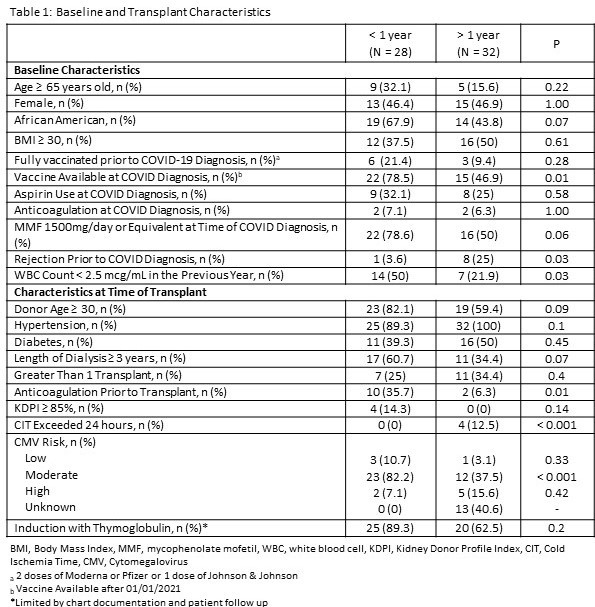COVID-19 Infection Post-Transplant: What is the Collateral Damage to the Graft? A Case for Pre-Transplant Vaccination
1Department of Pharmacy, Medical University of South Carolina, Charleston, SC, 2Department of Transplant Nephrology, Medical University of South Carolina, Charleston, SC, 3Department of Transplant Surgery, Medical University of South Carolina, Charleston, SC
Meeting: 2022 American Transplant Congress
Abstract number: 609
Keywords: COVID-19, Graft survival, Kidney transplantation, Mortality
Topic: Administrative » Administrative » 01 - Quality Assurance Process Improvement & Regulatory Issues
Session Information
Session Name: Quality Assurance Process Improvement & Regulatory Issues
Session Type: Poster Abstract
Date: Saturday, June 4, 2022
Session Time: 5:30pm-7:00pm
 Presentation Time: 5:30pm-7:00pm
Presentation Time: 5:30pm-7:00pm
Location: Hynes Halls C & D
*Purpose: COVID-19 produces an unpredictable immune reaction and is challenging to manage during active infection and post-infection, in kidney transplant (KTX) recipients. The first peak of the COVID-19 pandemic occurred in South Carolina (SC) starting in May 2020. The aim of this evaluation was to identify the impact of COVID-19 infection on KTX recipient outcomes starting at the peak of the pandemic.
*Methods: This was a retrospective, observational evaluation performed as part of the quality assessment performance improvement program. Patients ≥ 18 years, who underwent a KTX, were managed by our center, and developed a COVID-19 infection in the post-transplant period were included. Patients were further divided into two groups, depending on the time from transplant as of May 2020. Descriptive statistics, including Chi squared, Fischer’s Exact, and T-tests, were used to evaluate the data using IBM SPSS Statistics. An immunosuppression (IS) adjustment was defined as a reduction in dose, due to the presence of an acute viral illness.
*Results: From June 2020 to September 2021, 60 patients were identified to have COVID-19. Patients who were <1-year from transplant had a higher incidence of COVID-19 in the first 3 months post-transplant and an increased rate of hospital admission (p = 0.02). 22 patients (79.6%) <1-year from transplant, required an adjustment to IS versus 16 patients (50%) who were >1-year from transplant. 20% (12/60) of patients died post-COVID-19 versus the SC mortality rate of 1.7% as of 11/2021, based on confirmed deaths/cases (12,292/734,555). Rejection post-COVID-19 occurred in 2/60 patients, see Table 2.
*Conclusions: In KTX recipients <1-year post transplant, an earlier diagnosis of COVID-19 in the post-transplant period, increased IS adjustment, and a higher incidence of hospital admission was observed. This data was used to justify the requirement for a COVID-19 vaccine prior to transplant listing and for all patients currently on the waiting list.
To cite this abstract in AMA style:
Fabick A, Overly E, Rao V, Rohan V, Patel N, DuBay D, Candland C, Pilch N. COVID-19 Infection Post-Transplant: What is the Collateral Damage to the Graft? A Case for Pre-Transplant Vaccination [abstract]. Am J Transplant. 2022; 22 (suppl 3). https://atcmeetingabstracts.com/abstract/covid-19-infection-post-transplant-what-is-the-collateral-damage-to-the-graft-a-case-for-pre-transplant-vaccination/. Accessed February 16, 2026.« Back to 2022 American Transplant Congress


